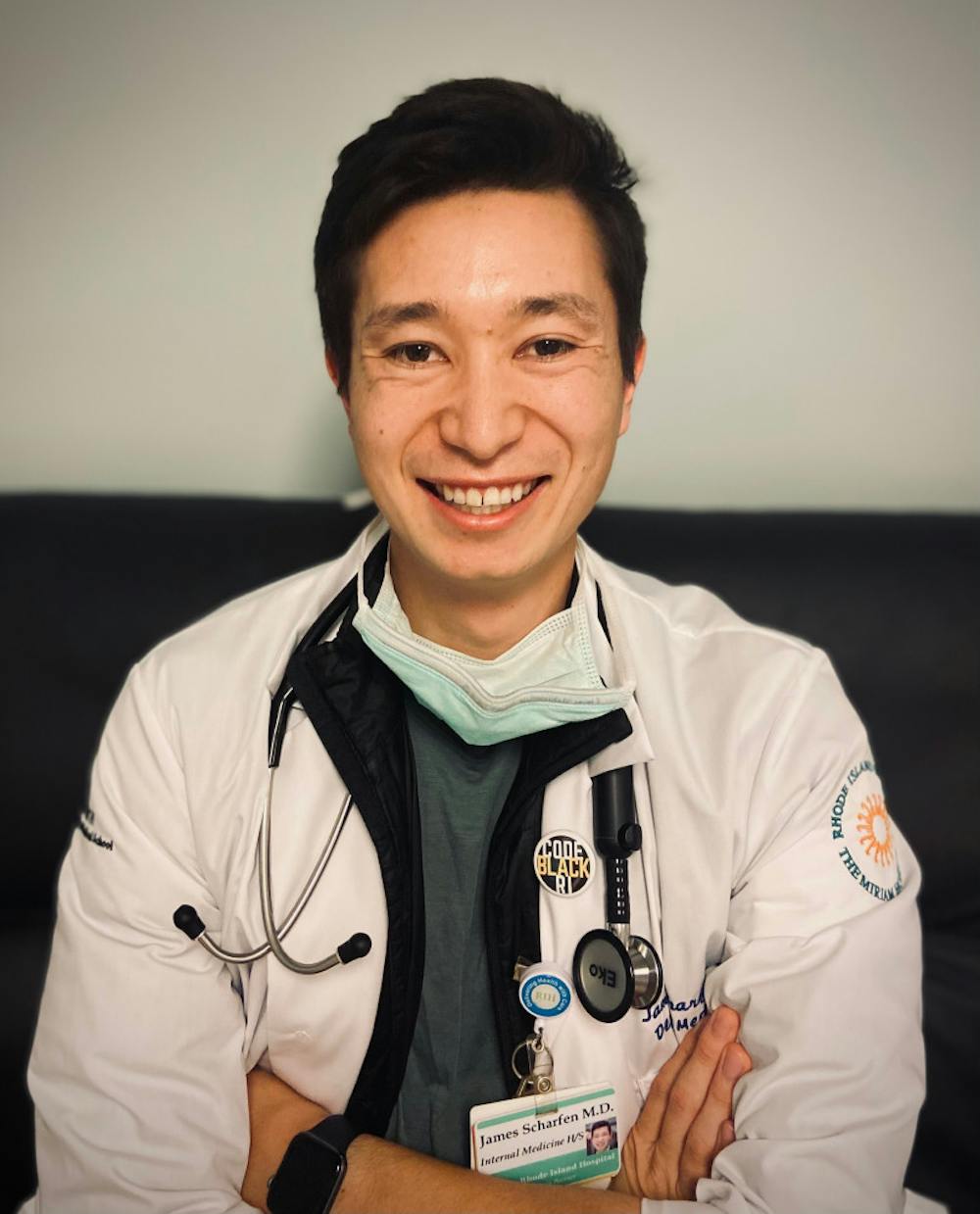For some, the past year has felt like a decade. For others, it has gone by in what feels like a few days. For the professors and recent Alpert Medical School graduates who were drafted to work on the front lines of the COVID-19 pandemic, the months since the pandemic started have been anything but easy.
‘Just trying to survive’
If you had asked Megan Ranney MPH’10, founding director of the Brown-Lifespan Center for Digital Health and associate professor of emergency medicine, what she thought the next year would look like on March 11, 2020, when the World Health Organization declared COVID-19 a pandemic, she would not have had an answer.
“I was just looking at the next day,” said Ranney. “I was just trying to survive, both literally and emotionally, as a public health professional, a professor and as a mom.”
Philip Chan, consultant medical director for RIDOH and associate professor of medicine at the University, recalls that the initial few weeks, after the first cases of COVID-19 in Rhode Island were recorded, moved at a “crazy unsustainable pace.”
“In the beginning, we were working 16-17 hour days, seven days a week for several months,” Chan said. Now, the department has “staffed-up” around the state, with an entire statewide team to address COVID-19.
The days are still long, added Chan, but things have been “less crazy.”
Rhode Island confirmed its first official case on March 1, 2020. Chan was at his mother’s house in New Hampshire when he got the call on February 29, 2020, prompting him to drive straight back to Rhode Island and meet with other members of the Department of Health and decide their next steps before they announced the case to the public the following day.
“I never actually thought we would see a pandemic to this degree,” he admitted.
People died in the 1918 Spanish flu pandemic, Chan recalled, due to secondary bacterial pneumonia. Given modern-day antibiotics, Chan was optimistic that the pandemic would soon be under control.
Instead, the country saw a national shortage of masks and frontline workers, as states asked retired physicians to return to clinical work when existing healthcare workers were stretched thin at overflowing hospitals.
In fact, in an unprecedented and historical move, the University’s Warren Alpert Medical School gave fourth-year medical students who had completed their degree requirements the opportunity to graduate six weeks early and start working in hospitals immediately.
James Scharfen MD’20 was one of 30 graduates who graduated early to work clinically at either Lifespan or Care New England. More than a hundred of his other classmates volunteered to work at the RIDOH and local hospitals managing call centers and medical records.
Scharfen didn’t know what to expect going into his first few days as a doctor.
“There’s a different level of responsibility being a doctor,” he said. “You feel very responsible for those you take care of, and you feel the responsibility to do right by them –– and that’s intimidating on your first few days, especially as the whole system is stressed.”
The weeks Scharfen spent immediately after graduating early likely had a negligible impact on his overall training, but gave him and other graduates much more experience working in respiratory cases and with ventilators in the intensive care unit.
“It’s the irony of medical training that because of the hardships our patients are going through, we see some really very good on-the-ground training,” Scharfen said.
As hospital activity has slowed down, Scharfen, now a first-year resident at Rhode Island Hospital, has been able to approach his patients more presently.
“As you get more accustomed to the job, you have to kind of break yourself out of that habit of the constant rush,” Scharfen said. “You have to remind yourself to kind of take that breath and really spend that time with each patient.”
‘The politicization of the pandemic’
Ranney believes that the country has done both better and worse than she anticipated, emphasizing that disorganization and misinformation, as well as the politicization of the pandemic, have contributed to the “unchecked spread” of the virus.
“I never anticipated that we would get vaccinations this quickly,” Ranney said. “But I really thought (last March) that if we just set up the right structures, the federal government would come in and get this pandemic under control.”
Ranney noted that the Biden administration has been able to improve the country’s response in ways they can control, particularly in the Centers for Disease Control and Prevention’s updated policies and guidance.
But, Ranney added, they haven’t been able to change the “unfortunate politicization” of the pandemic, nor have they been able to control the spread of misinformation.
“What the Biden administration is doing is not based on politics, but on data and public health,” said Ranney. “But between the mask burning in Iowa and the lifting of mandates in Texas, this is seen as a political issue.”
“We’ve never done anything like this before in the country, let alone the state of Rhode Island,” Chan said.
RIDOH’s goal, according to Chan, is to vaccinate the entire population of the state, and urges all individuals, whether they think they’re at risk or not, to get the vaccine.
“Even if you are young and otherwise healthy and don’t think you’re at risk, you have got to get the vaccine for the people around you,” Chan urged. “There are people dying left and right from older populations, so you (have) got to protect people in your household –– maybe your parents, your grandparents –– the reason to get the vaccine is for them.”
Ranney echoed Chan, adding that vaccinations against the novel variants of the virus are critical in avoiding a resurgence of cases.
“Our ability to go back to normal is all predicated on the fact that our vaccines are effective against novel variants,” said Ranney. “But we’re going to have to change our definition of normal.”
‘Back to normal, whatever that may mean’
While President Biden’s announcement that all Americans would have access to a vaccine by the end of May indicates the end may be near, Chan and Ranney both warn that the pandemic is definitely not over yet.
Ranney, Chan and Scharfen have all experienced the toll the pandemic has taken on their mental health.
“Burnout rates among healthcare providers are sky-high,” said Chan, “Mental illness is through the roof in general in our population.”
Chan has maintained his own physical and mental health by running every day, making sure to get enough sleep and eating healthily.
Ranney remarked on the power of social media to keep people connected as social distancing mandates kept families and friends apart.
“Social media has really served as an amazing support system for me,” Ranney said. She said she wouldn’t have made it through the past year without phone calls and connections on Twitter with friends and colleagues across the country.
Looking back on themselves a year ago, both physicians don’t think they would have done anything differently.
Though Chan wishes his team could have responded more aggressively and instated travel mandates earlier, he says he otherwise regrets nothing. He noted that his team and the scientific community have gained a lot of experience and will be able to better handle a similar situation in the future if there is one.
Ranney similarly wouldn’t have done anything differently, besides remind herself and her children to hug their grandparents while it was still safe. Though her parents live nearby and she has seen them outdoors, the hardest part has been not being able to spend “real time with them.”
The power of collective voices has been the most surprising outcome of the pandemic, Ranney said.
“I’ve been impressed with how many people are willing to step up in a crisis,” she said. “It’s been amazing to watch people move in a whole new direction and go out of their way to come together for change.”

Gaya Gupta was Senior Editor of Digital News for the 132rd Editorial Board. She previously covered diversity on campus. She is a junior from the San Francisco Bay Area studying computer science and English.





